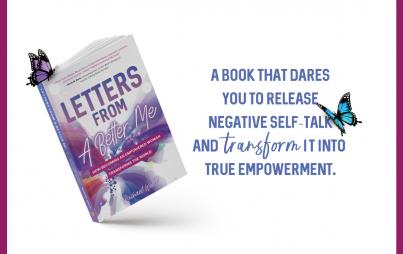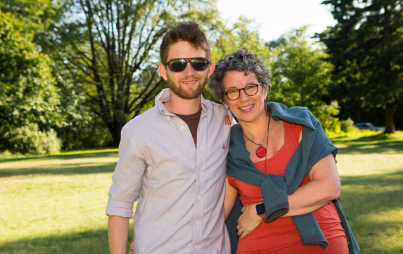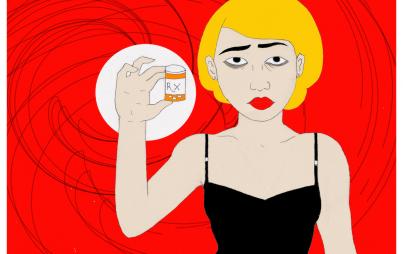
How can I live in this happiness without being ashamed of it? (Image via Unsplash/ Micah. H)
Lisa Marie Basile's What's Not Said column explores topics people feel uncomfortable talking about out loud — things that exist in nuance and areas of shame or misunderstanding.
I have always struggled with depression. I used to think of it as my differentiator, my sad friend, my little black shadow. It was always there, hovering under the surface, waiting to come up and say, “Now you will only see ME.” I’ve come to recognize its patterns, now: I have my own seismograph. When these vibrations are detected, I can either prepare, or I’ve already been crushed under the rubble. I am sure that many of you have felt similarly. It’s a process, and it’s always something that needs to be tended to.
So when things go well — when we finally have found a method, or an approach, to sustain happiness — there can be some fallout.
For one, there are the interpersonal considerations: How can I be happy without being obnoxious? Without isolating those around me? Without making others uncomfortable? How do I reveal the new me? How can I feel happy in a world where others aren’t?
And there’s the personal to consider: How can I live in this happiness without being ashamed of it? (Because for a lot of us, happiness is a sort of mythos, a unicorn spotted in the wild; we have no idea how to handle it.)
I was afraid of wearing the okay-ness. Walking into a room as the happy person felt insincere. And it felt like a mask, that my real, sad self was underneath somehow, waiting to take hold and shout, “Just kidding!”
Early last year I came out of a massive depression, triggered by PTSD symptoms. I was truly, and profoundly sad. I was just sad. My body was heavy and sick and oppressive; I felt like nothing about my existence mattered. It was triggered by a series of life changes (that were ultimately very good, but which I felt ashamed of owning because change is what triggers my PTSD). I felt I didn’t deserve the good things that had come my way. I had a great job, a great new apartment and I was self-actualized. So, naturally, I thought, what’s next? What goes up must come down.
I felt like there was a lie living, and suckling from, my skin.
How do I live in this space of peace and safety, I wondered? There was no threat. There was no monster. My happiness is what undid me, ironically. I worried so much about being OK with the happiness that I fell apart.
Eventually, though, I realized it wasn’t just that. Those good things were surface triggers; it wasn’t just happiness I was ashamed of feeling — it was inhabiting this new person in the world. I was shedding layers. I was trans-morphing, evolving. I wasn’t afraid of how things might fall. Things might always fall.
I was afraid of wearing the okay-ness. Walking into a room as the happy person felt insincere. And it felt like a mask, that my real, sad self was underneath somehow, waiting to take hold and shout, “Just kidding!”
Anais Nin wrote, “I have always been tormented by the image of multiplicity of selves. Some days I call it richness, and other days I see it as a disease, a proliferation as dangerous as cancer. My first concept about people around me was that all of them were coordinated into a WHOLE, whereas I was made up of multiple selves, of fragments.”
I don’t think Nin is alone in this thinking. I believe there are multiple selves in each of us; they come from our environments, our experiences, our lineage, our learning, our traumas — and they are somehow acting in sync to form a whole person.
But when one self has had too much stage time, it naturally wants that back. The happy self cowers. It’s a glitch in our plurality.
I felt that the only thing I could do to answer to this lack of reconciliation was to be present. Now, this might sound like bullshit. Be present? What does that even fucking mean?
This: I allowed myself to feel happy, proud, transformed when I felt it, but I didn’t beat myself up when I worried about it not feeling right.
I just let it happen. Then, I gently redirected myself to my original feelings. Like mindful meditation, you’re always going to be distracted. Because life is distracting! Just come back to the present. If it happens a million times, you redirect it a million times; eventually, you will learn to be okay. You rewire. You rewrite.
But there can often be a strangeness between people when someone has adopted a new way of living. When it comes to handling friends who may not be used to the happy you, it’s worthwhile to come at it from the point of compassion. Some people like to keep misery for company; you may have played that role for them. If you’re at peace, if you’re happy, then you may make someone feel targeted. They may feel ashamed of not finding happiness, they may feel like you will think less of them, they may lash out because they want what you have. It’s okay.
But here’s the truth: We don’t have all the energy on earth to expend on people who aren’t willing to make space for who we are, even if it hurts them.
That’s where their self-care comes into play; you shouldn’t be abused because they haven’t figured it out.
It’s up to you to decide if this person is worth it. Without proselytizing or isolating them, talk about how you’ve gone through a personal transformation if it comes up, and ask them if there’s anything you can to support them. Leave it there.
Secondly, if there are people in life who encourage our happiness, we ought to gravitate towards them. They’re the ones who make room for trial and error, who make space for the black, white, and gray.
Be aware of your feelings, let them pass through you, keep yourself safe, and always remember that you have a right to be happy.








